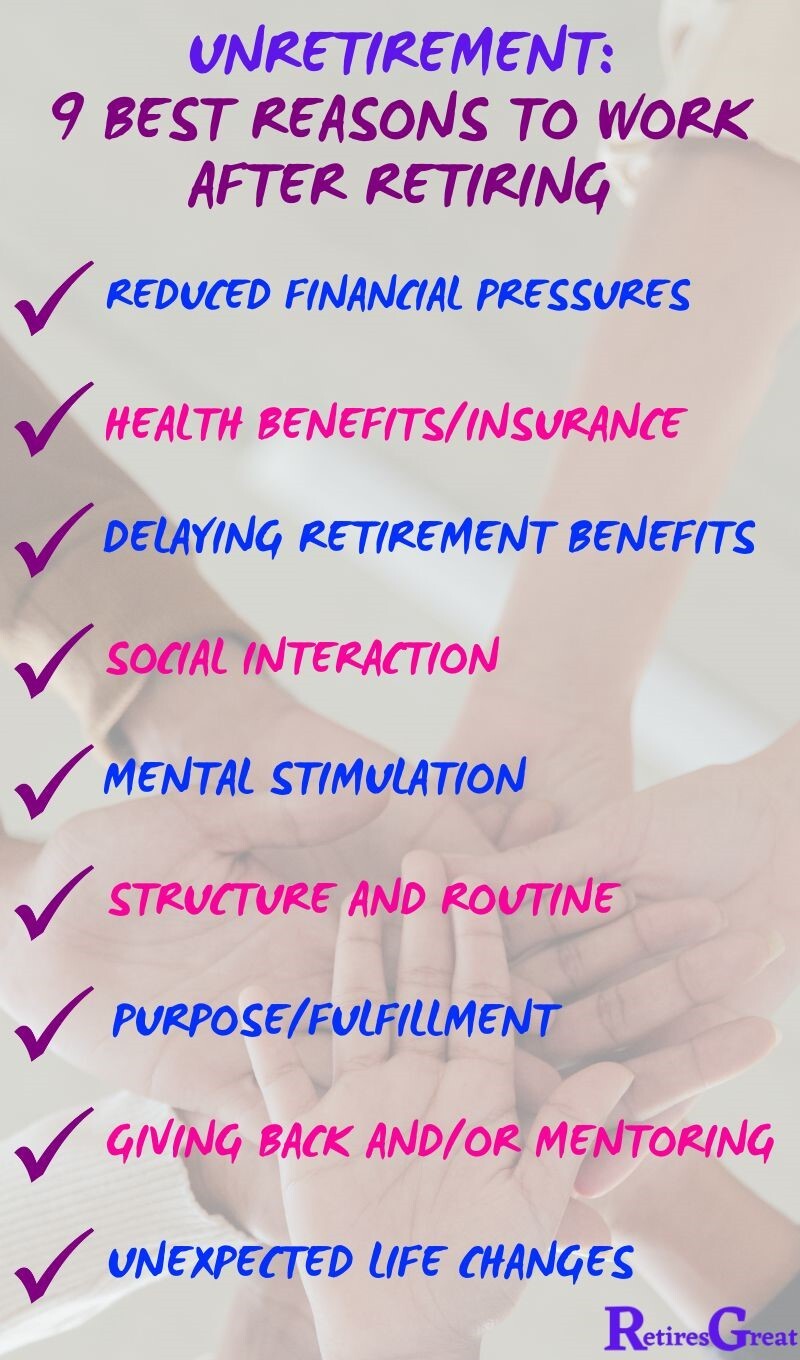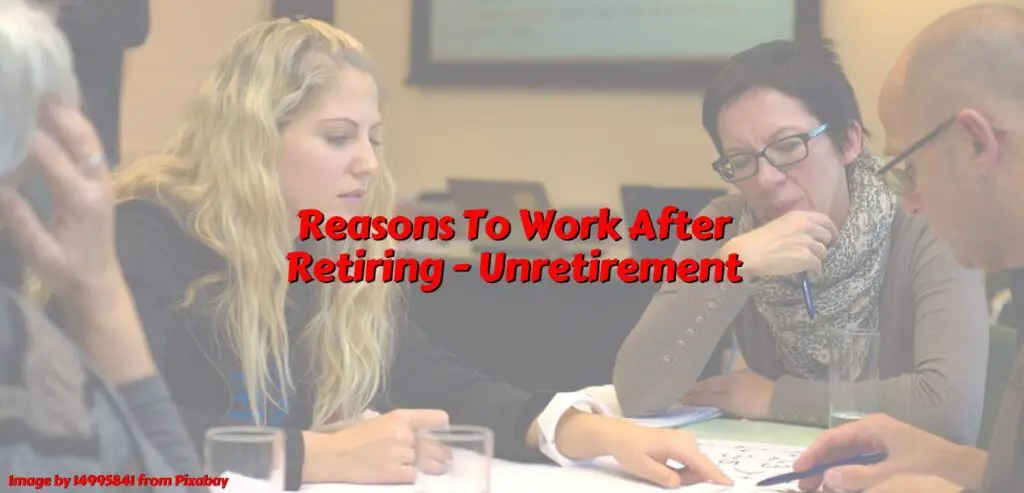Almost everyone eagerly looks forward to the day they retire. Being able to do whatever they want when they want is life changing. However, as the honeymoon period wanes, many retirees feel as if something is missing.
This can lead to restlessness and looking for something more. In fact, it appears working provides numerous benefits and many folks begin to consider their reasons to work after retiring.
This is referred to as “unretiring or unretirement”. According to Rand.org, nearly half of all retirees return to the workforce.
Unretirement is when people who have retired, or are ready to retire, decide to rejoin, or stay, in the workforce. The reasons for this decision vary depending on the person’s financial position, health status and even social needs.
Depending on your circumstances, going back to work could offer many benefits. However, it’s a personal decision requiring careful thought, consideration and planning before “jumping back in the saddle”.
In addition, there may be employment opportunities out there which would be far more satisfying than your previous position.

Reduced Financial Pressures
The greatest retirement fear is outliving your savings. Everything is increasingly more expensive and healthcare costs continue to sky rocket. Coupled with the fact we’re living longer than previous generations; this is a valid concern for many.
Rejoining the workforce for a few more years helps ease these financial pressures. Some things could have arisen which weren’t accounted for initially. Or these additional funds can cover day-to-day or unexpected expenses, outstanding debts and/or boost retirement savings.
Also, having some extra money could allow you to splurge on doing things you otherwise may not be able to afford.
The counter argument is understanding the implications of additional income. It could raise you into a new tax bracket, causing you to owe more to the government or reduce some benefits.
Health Benefits/Insurance
One of the biggest reasons to work after retiring, are employer benefits such as a healthcare plan. We all know how expensive private insurance can be, especially for anyone under 65 and not yet eligible for Medicare.
Any health issues can lead to unexpected medical costs; which can quickly add up. Thus, having employer benefits can help alleviate the strain on your retirement nest egg.
The more progressive organizations understand the value of older experienced workers. Their skills and knowledge are difficult to replace. As such, many provide benefits even for part-time employment.
Delaying Retirement Benefits
Unretiring provides the option to delay benefits, such as Social Security. The monthly payment increases by 8% for each year it is delayed, up until the age of 70. As of 2023, the maximum benefit at age 62 is $2,572.00. This increases to $3,627.00 at age 65. This would be an increase of $1,055.00 per month for the rest of your life!
However, the million-dollar question comes down to how long do you expect to live? Those with serious health conditions or a family history of premature death should likely consider applying earlier than later. The financial breakeven point between retiring at 62 or 65 is around 77.5 years.
Social Interaction
One of the biggest reasons to work after retiring, is missing the social connections with your work mates. There could be an emptiness from not having those day-to-day conversations. Once the common bond of a job is gone, a lot of colleagues tend to fade away.
As we get older, it’s more difficult to find and meet like-minded people to make new friends. It takes more effort than it did when we were younger. Especially, being retired we’re not around a huge group of people on a regular basis.
Rejoining the workforce expands our social interaction and friendships. As a retiree, with the skills and expertise acquired over the years, getting a position around a diverse group of individuals is much easier than when we were first job hunting.
Networking is key when considering re-entering the workplace. This could include getting in touch with previous work colleagues or exploring new fields of interest. More often than not, the best positions are never posted.
For more thoughts on expanding your friendships, see our posts, 8 tips for keeping workplace friends during retirement and surefire ways to make friends in retirement and keep them.
Mental Stimulation
Another of the reasons to work after retiring is mental stimulation and personal growth. This may sound weak as far too many jobs are perceived as mind numbing and draining. However, even the most menial of positions require communication with others and basic problem solving.
More “knowledge worker” type careers require a much higher level of cognitive functioning. Not only do these more greatly engage the mind, they help keep you mentally sharp. This, in turn, is conducive to greater job satisfaction and taking pride in your work.
The brain is much like a muscle which needs to be exercised. With all we understand about dementia, the mental stimulation work provides might very well help ward off this terrible disease.
Structure And Routine
As much as everyone hates to admit it, we all need some structure in our lives. Some reason to get out of bed, other than taking our meds. Another of the benefits of work is creating a structure and routine. Without it, some folks flounder and fill their days with meaningless activity.
Even a part-time or volunteer position will add structure to your week. You’ll be setting aside time on a regular basis to be where you need to be. And if you find something you enjoy, not only will you will look forward to it, it will also energize you.
Purpose/Fulfillment
Many folks’ identities become intertwined with their jobs. They feel useful, productive and like they’re contributing to society. In some situations, their position becomes part of their identity. In a very real sense, their jobs provided a sense of purpose and fulfillment.
The truth is most of us took pride in doing a good job and our accomplishments. After leaving work, this can create a vacuum which can be difficult to fill in a meaningful manner.
Going back to work, even in an unrelated field, can help restore feelings of doing something worthwhile. Especially when it’s something you’re interested in and makes a difference.
Giving Back And/or Mentoring
Baby boomers are, generally, characterized as having a lot of knowledge and skills. This makes sense as the majority of us have decades of experience. All too often, this expertise is lost the day they leave.
As previously mentioned, some organizations are striving to retain their highly trained older workers. This is an excellent opportunity to give back by mentoring their younger counterparts and pass on their experience.
Another example could be teaching at the local college. Many educational institutions seek instructors with real-world expertise. There are many different ways of giving back and potentially finding a rewarding position.
Unexpected Life Changes
The only constant in life is it will always change. And often in ways we don’t anticipate. Examples could include health issues such as a diagnosis of a crippling disease, separation/divorce, death of a spouse or any one of numerous other life changing events.
Depending upon the situation, this might mandate returning to work. This could be due to dire financial need such as dealing with crushing medical bills. In other instances, it might be the social aspect and interacting with others after the loss of a spouse.
These unexpected life changes can definitely upset the apple cart and impact even the best laid plans.
Closing Thoughts on Best Reasons to Work After Retiring
While retirement is something most of us dream about for years, it’s not always a bed of roses. Statistically, nearly half of retires “unretire” and return to the workforce. Undeniably, there are many benefits of working. These could be economic stability, the social aspect, keeping active or due to a life changing event.
If unsure about financial implications, it might be wise to consult with some sort of financial advisor to understand the impact on retirement benefits and taxes.
The decision to return to the workforce is a personal one. It’s essential to carefully weigh all the pros and cons against your life situation, priorities and goals. Taking into account how this choice will affect your health or future plans is important.

